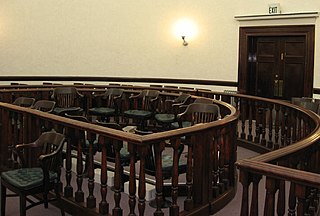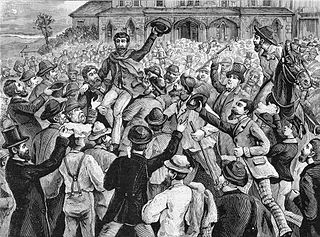Contempt of court, often referred to simply as "contempt", is the crime of being disobedient to or disrespectful toward a court of law and its officers in the form of behavior that opposes or defies the authority, justice, and dignity of the court. A similar attitude toward a legislative body is termed contempt of Parliament or contempt of Congress. The verb for "to commit contempt" is contemn and a person guilty of this is a contemnor or contemner.
In jurisprudence, double jeopardy is a procedural defence that prevents an accused person from being tried again on the same charges following an acquittal or conviction and in rare cases prosecutorial and/or judge misconduct in the same jurisdiction. Double jeopardy is a common concept in criminal law - in civil law, a similar concept is that of res judicata. The double jeopardy protection in criminal prosecutions only bars an identical prosecution for the same offence, however, a different offence may be charged on identical evidence at a second trial. Res judicata protection is stronger - it precludes any causes of action or claims that arise from a previously litigated subject matter.

A jury trial, or trial by jury, is a legal proceeding in which a jury makes a decision or findings of fact. It is distinguished from a bench trial in which a judge or panel of judges makes all decisions.

A jury is a sworn body of people (jurors) convened to hear evidence, make findings of fact, and render an impartial verdict officially submitted to them by a court, or to set a penalty or judgment.
Jury nullification (US/UK), jury equity (UK), or a perverse verdict (UK) occurs when the jury in a criminal trial gives a not guilty verdict regardless of whether they believe a defendant has broken the law. The jury's reasons may include the belief that the law itself is unjust, that the prosecutor has misapplied the law in the defendant's case, that the punishment for breaking the law is too harsh, or general frustrations with the criminal justice system. Some juries have also refused to convict due to their own prejudices in favor of the defendant. Such verdicts are possible because a jury has an absolute right to return any verdict it chooses.

In common law jurisdictions, an acquittal means that the prosecution has failed to prove that the accused is guilty beyond a reasonable doubt of the charge presented. It certifies that the accused is free from the charge of an offense, as far as criminal law is concerned. The finality of an acquittal is dependent on the jurisdiction. In some countries, such as the United States, an acquittal prohibits the retrial of the accused for the same offense, even if new evidence surfaces that further implicates the accused. The effect of an acquittal on criminal proceedings is the same whether it results from a jury verdict or results from the operation of some other rule that discharges the accused. In other countries, like Australia and the UK, the prosecuting authority may appeal an acquittal similar to how a defendant may appeal a conviction — but usually only if new and compelling evidence comes to light or the accused has interfered with or intimidated a juror or witness.
A hung jury, also called a deadlocked jury, is a judicial jury that cannot agree upon a verdict after extended deliberation and is unable to reach the required unanimity or supermajority. A hung jury may result in the case being tried again.

Capital punishment in India is a legal penalty for some crimes under the country's main substantive penal legislation, the Indian Penal Code, as well as other laws. Executions are carried out by hanging as the primary method of execution per Section 354(5) of the Criminal Code of Procedure, 1973 is "Hanging by the neck until dead", and is imposed only in the 'rarest of cases'.
Beyond (a) reasonable doubt is a legal standard of proof required to validate a criminal conviction in most adversarial legal systems. It is a higher standard of proof than the standard of balance of probabilities commonly used in civil cases because the stakes are much higher in a criminal case: a person found guilty can be deprived of liberty or, in extreme cases, life, as well as suffering the collateral consequences and social stigma attached to a conviction. The prosecution is tasked with providing evidence that establishes guilt beyond a reasonable doubt in order to get a conviction; albeit prosecution may fail to complete such task, the trier-of-fact's acceptance that guilt has been proven beyond a reasonable doubt will in theory lead to conviction of the defendant. A failure for the trier-of-fact to accept that the standard of proof of guilt beyond a reasonable doubt has been met thus entitles the accused to an acquittal. This standard of proof is widely accepted in many criminal justice systems, and its origin can be traced to Blackstone's ratio, "It is better that ten guilty persons escape than that one innocent suffer."
Priyadarshini Mattoo was a 25-year-old law student who was found raped and murdered at her house in New Delhi on 23 January 1996. On 17 October 2006, the Delhi High Court found Santosh Kumar Singh guilty on both counts of rape and murder, and on 30 October of the same year sentenced him to death. On 6 October 2010, the Supreme Court of India commuted the death sentence to life imprisonment. Santosh Kumar Singh, the son of an Inspector-General of Police, had earlier been acquitted by a trial court in 1999, and the High Court decision was widely perceived in India as a landmark reversal. This decision was overturned as the facts were not presented correctly in the lower court.

Times Now is an English news channel in India owned and operated by The Times Group. The channel launched on 23 January 2006 in partnership with Reuters. It is a pay television throughout India. Until 2016, it was India's most popular and the most viewed English news channel.
Brij Bhushan Sharan Singh is an Indian politician who is serving as Member of Parliament from Kaiserganj as a member of the Bharatiya Janata Party. He was the president of the Wrestling Federation of India.

In the legal jurisdiction of England and Wales, there is a long tradition of jury trial that has evolved over centuries. Under present-day practice, juries are generally summoned for criminal trials in the Crown Court where the offence is an indictable offence or an offence triable either way. All common law civil cases were tried by jury until the introduction of juryless trials in the new county courts in 1846, and thereafter the use of juries in civil cases steadily declined. Liability to be called upon for jury service is covered by the Juries Act 1974.
Racial discrimination in jury selection is specifically prohibited by law in many jurisdictions throughout the world. In the United States, it has been defined through a series of judicial decisions. However, juries composed solely of one racial group are legal in the United States and other countries. While the racial composition of juries is not dictated by law, racial discrimination in the selection of jurors is specifically prohibited. Depending on context, the phrases "all-white jury" or "all-black jury" can raise the expectation that deliberations may be unfair.

Jagtar Singh Hawara is a high level member of Babbar Khalsa who is currently serving life imprisonment at Tihar Jail. He was convicted as a conspirator in the assassination of 12th Chief Minister of Punjab, Beant Singh.
The 2G spectrum case was a political controversy in which politicians and private officials of the United Progressive Alliance (UPA) coalition government India were allegedly involved in selling or allotting 122 2G spectrum licenses on conditions that provided an advantage to specific telecom operators. A. Raja, then Telecom Minister, was accused of selling 2G spectrum licenses at a very low cost which resulted in the loss of ₹1,760 billion in government revenue. Raja was also accused of not following rules and regulations as well as not recognizing any advice from the Ministries of Finance and Law and Justice of India while allotting 2G spectrum licenses to telecom operators. Series of allegations were made on allotting 2G spectrum licenses including allegations from Central Bureau of Investigation after investigating the case alleging Raja for intentionally advancing the cut-off date to favour some specific firms, which were allegedly ineligible for applying for telecom licenses, in return for bribes.

Trial by jury in Scotland is used in the courts of Scotland in solemn procedure for trial on indictment before a judge and jury for serious criminal cases, and in certain civil cases.
The Jasleen Kaur harassment controversy stemmed from the allegation of sexual harassment made by Jasleen Kaur against Sarvjeet Singh in 2015 and the events that followed. In August 2015, Jasleen Kaur, a woman from Delhi posted a photo of Sarvjeet Singh on Facebook, alleging that Singh had sexually harassed her. The post went viral on social media in India, garnering widespread attention. National celebrities and politicians provided Kaur with widespread support for raising her voice against eve-teasing and sexual harassment on social media.

Rebecca Mammen John is a Senior Advocate at the Supreme Court of India, and works primarily in the field of criminal defence. She has represented parties in several widely reported cases, including the families of victims of the 1987 Hashimpura massacre, Indian stockbroker Harshad Mehta, and the accused in the Aarushi murder case. She has also been appointed as a Special Public Prosecutor on occasion by the High Court of Delhi, and frequently comments in leading newspapers and the media on issues of criminal justice reform in India.
Manav Singh ; was a 17-year-old boy from Gurugram, India, who committed suicide after being falsely accused of sexual harassment by Bhavleen Kaur on her Instagram stories. The boy committed suicide by jumping off the 11th floor balcony of his home on May 4, 2020. Following the allegations, he was bullied, shamed, and receiving threats.







